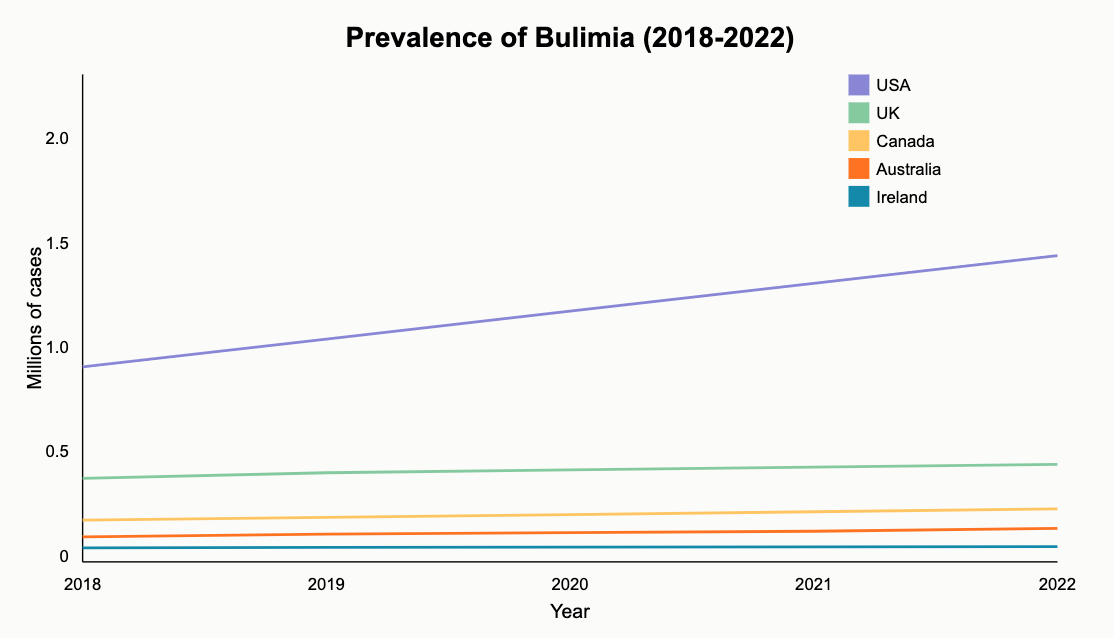Bulimia Nervosa

Have you ever felt like your life is being controlled by an endless cycle of eating and purging? Imagine constantly feeling the weight of guilt after a meal, to the point where you’re willing to go to extremes to get rid of it. This is the reality for many individuals suffering from Bulimia Nervosa. This serious eating disorder affects both the mind and body, trapping people in harmful patterns that can destroy their physical and emotional health. But with awareness and the right support, recovery is possible.
What is Bulimia Nervosa and How It Affects Your Life
Bulimia Nervosa is a psychological disorder characterized by recurrent episodes of binge eating, followed by compensatory behaviors like vomiting, fasting, or excessive exercise. These behaviors are often driven by an intense fear of gaining weight or an unhealthy obsession with body image. Over time, bulimia can lead to serious physical health issues such as electrolyte imbalances, gastrointestinal problems, and even heart complications.
Take for instance the character from the movie To the Bone (2017), which portrays a young woman struggling with an eating disorder. Although the film focuses on anorexia, bulimia shares the same level of emotional turmoil and control over one’s life.
How Common is Bulimia? Recent Statistics (2018-2023)
Bulimia is not a rare condition, and its prevalence has been studied worldwide. Below is a table showing the number of cases reported in various countries over the past five years:

As you can see, bulimia has affected millions globally, highlighting the importance of early diagnosis and treatment.
Causes of Bulimia Nervosa: Uncovering the Root
The causes of bulimia are complex and multifactorial, involving psychological, genetic, and environmental factors. Media and societal pressures to maintain a “perfect” body image contribute significantly to the development of the disorder. Celebrities, like Princess Diana, have openly discussed their battle with bulimia, shedding light on how external pressures can deeply affect one’s self-perception and relationship with food.
Who is Most at Risk for Bulimia?
Bulimia is most often diagnosed in teenagers and young adults, particularly women, though men are not immune to the disorder. It typically develops in late adolescence or early adulthood, though individuals of any age can be affected. Factors such as low self-esteem, perfectionism, and a history of trauma or abuse can increase the risk of developing bulimia.
How Bulimia Nervosa is Diagnosed
Diagnosis typically involves a combination of psychological evaluations and physical exams. A healthcare professional may ask about your eating habits, emotional state, and any behaviors related to food. Tests like blood work and EKGs may also be necessary to assess any physical complications that have resulted from bulimia.
Seeking Help: Who to Contact
If you suspect that you or someone you love is struggling with bulimia, it’s essential to seek help. Here is a list of organizations you can contact for support:
| Country | Organization | Phone Number | Website |
|---|---|---|---|
| USA | National Eating Disorders Association (NEDA) | 1-800-931-2237 | www.nationaleatingdisorders.org |
| UK | Beat | 0808 801 0677 | www.beateatingdisorders.org.uk |
| Canada | NEDIC | 1-866-633-4220 | www.nedic.ca |
| Australia | Butterfly Foundation | 1800 33 4673 | www.butterfly.org.au |
| Ireland | Bodywhys | 01-2107906 | www.bodywhys.ie |
How is Bulimia Treated?
Treatment for bulimia typically involves a combination of psychotherapy, nutritional counseling, and sometimes medication. Cognitive Behavioral Therapy (CBT) is one of the most effective approaches, helping individuals challenge and change unhealthy thinking patterns around food and body image.
For example, in the TV series This Is Us, one of the characters battles with body image and overeating. Although not directly linked to bulimia, the psychological undertones of unhealthy relationships with food are accurately depicted, showing the importance of therapy and support.
Frequently Asked Questions (FAQ)
- Can bulimia be cured?
While there’s no definitive “cure,” recovery from bulimia is possible with the right treatment and support. - How long does it take to recover from bulimia?
Recovery varies from person to person. It can take months to years, depending on the severity and individual circumstances. - Is bulimia more common in women than men?
Yes, bulimia is more common in women, but men can also develop the disorder. - Can bulimia cause long-term health problems?
Yes, bulimia can lead to severe health issues, including heart problems, digestive issues, and electrolyte imbalances. - What should I do if I suspect a loved one has bulimia?
Approach them with care and concern. Encourage them to seek professional help and offer to support them through the process. - Does bulimia affect mental health?
Yes, bulimia is often linked with mental health issues such as depression, anxiety, and low self-esteem. - What is the first step in treating bulimia?
The first step is recognizing that there is a problem. Seeking help from a healthcare provider or therapist is crucial for diagnosis and starting treatment.
Conclusion
Bulimia Nervosa is a challenging and life-altering disorder, but with early intervention and proper treatment, recovery is possible. Whether it’s through therapy, support groups, or simply reaching out for help, you can take back control of your life. If you or someone you know is struggling, don’t hesitate to contact one of the resources listed above.

